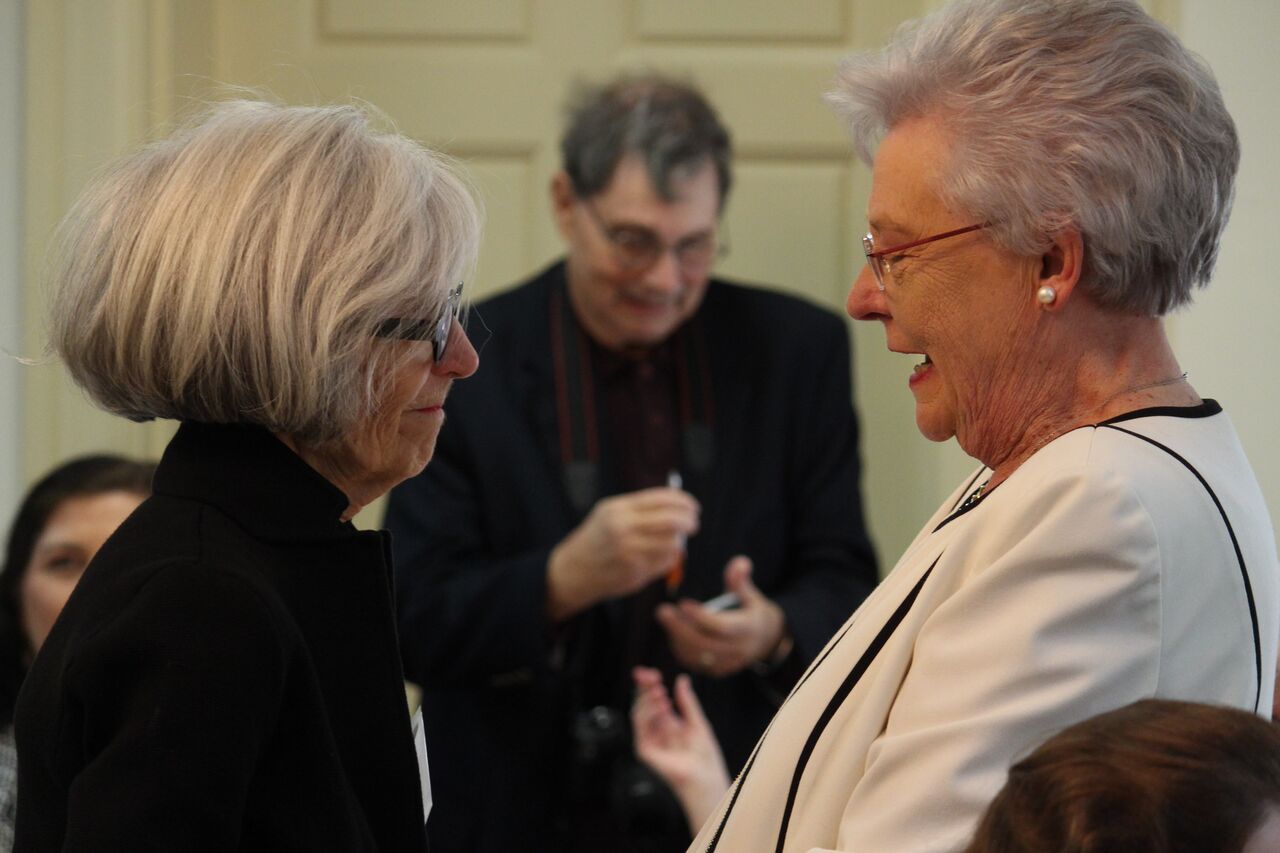
On a bright and chilly day on March 8, 2018, throngs of people flocked to the Alumnae Auditorium on the Judson College campus. Traveling distances both far and near, audience members joined together to celebrate and honor the lives of two special and innovative women and their pivotal roles in Alabama history. Jessie Welch Austin and Jeanne Friegel Berman were inducted into the Alabama Women’s Hall of Fame during its forty-seventh installation ceremony. Enticed inside by the melodic singing of Judson’s choir, attendees heard the heartfelt stories shared by members of the inductees’ families. As the ceremony began, Dr. Scott Bullard, Interim President of Judson College, welcomed attendees stating, “Welcome to a place, every day, that embodies higher education, especially for women. Welcome to a 48-year-old institution that honors some of the finest examples of women leaning into callings all over . . . our state of Alabama.”
Described as a “renaissance woman,” Jessie Welch Austin became the first female sheriff of Alabama in 1939 and held the position until 1943. As of 1947, Austin served as warden of the Julia Tutwiler Prison for six years, overseeing the care for female prisoners. Known by many as “Miss Jessie,” Jessie Welch Austin, along with her husband, William A. Austin, ran successful businesses in her home of Dothan, Alabama, including a mercantile business, an automobile dealership, a dry goods store, a grocery store, and eventually, one of the largest farming operations in Elmore County.
Sharing a story about his grandmother, J. Max Austin Jr. told audience members of his times driving his grandmother around in her car through the unfinished, unpaved roads of Alabaster, Ala. Her grandson’s driving speed was never truly fast enough for Mrs. Austin. Always ready to move on to the next point and goal in her life, she would simply say, “I would really like to go faster.” While highlighting her accomplishments, her grandsons also deeply stressed the love and dedication she had for her family. Another of her grandsons, Hugh W. Wheelless Jr. said, “She was a baby. She was a little girl. She was a woman. She was a wife. She was a mother. She was a sheriff. She was a warden. She was our grandmother.”
“Mrs. Berman was an icon,” Walter J. Berman declared. Reading aloud a letter written about his aunt by a close friend, Mr. Berman shared past memories with eager audience members.
A winner of multiple beauty contests, Jeanne Friegel Berman won the hearts of many, including Johnny Weissmuller, Olympic swimmer and actor best known for his leading role as Tarzan in the films of the 1930s and 1940s; she later declined his marriage proposal. During her lifetime, Jeanne Friegel Berman fought at the forefront of change, paving the way towards the promotion of women’s voting rights, disease prevention, educational progress, and mental health access.
“It was her charm, perseverance, and her deep conviction that women in Alabama should be registered voters, be active in national, state, and local government, and knowledgeable of the significant issues that concerned all citizens, not just women,” Walter J. Berman said, lovingly.
While caring for her three young sons, Mrs. Berman lobbied tirelessly for the greater good, serving as founder of the Alabama League of Women Voters, state chairman for the Christmas Seal Fundraiser, state treasurer of the Alabama Tuberculosis Association, president of the Montgomery Lung Association, and the first female member of the Southern Regional Education Board. Robert Berman, Jeanne Friegel Berman’s youngest son, began his speech, stating, “This is going to be a salute to my mother, Jeanne Berman, but also it’s going to be dedicated to the young women of Judson College because it’s an example of what you can be as well.”
Berman went on to share countless tales of his mother’s true love and dedication to her family, as well as her maturation into the innovative trailblazer she was meant to be. “Hoping to escape their oppressive life in Europe, both sides of my family were immigrants from across the pond. They had heard that the streets of America were paved with gold. Gold! Shining Gold!” Berman continued, “When they arrived on America’s shores, they found out three things: first, the streets were not paved with gold, secondly very few of the streets were even paved, and, three, they found out who was going to pave them. Mom was a paver, forging the way for equal rights for women and all people no matter what race, color, origin, or status.”
Sharing the stories of these “women of distinction,” helps present students of Judson College with uplifting and inspirational examples of the women they can grow to be. As Dr. Bullard stated, “they [Judson College students] study on the second floor. Above those memorable plaques, above those honorees.” Women such as Jessie Welch Austin and Jeanne Friegel Berman paved the roads of change and good will for all. He shared memories of his mother with the women of Judson College, Berman echoed Dr. Bullard’s points, stating that they, too could “become powerful engines of change.”